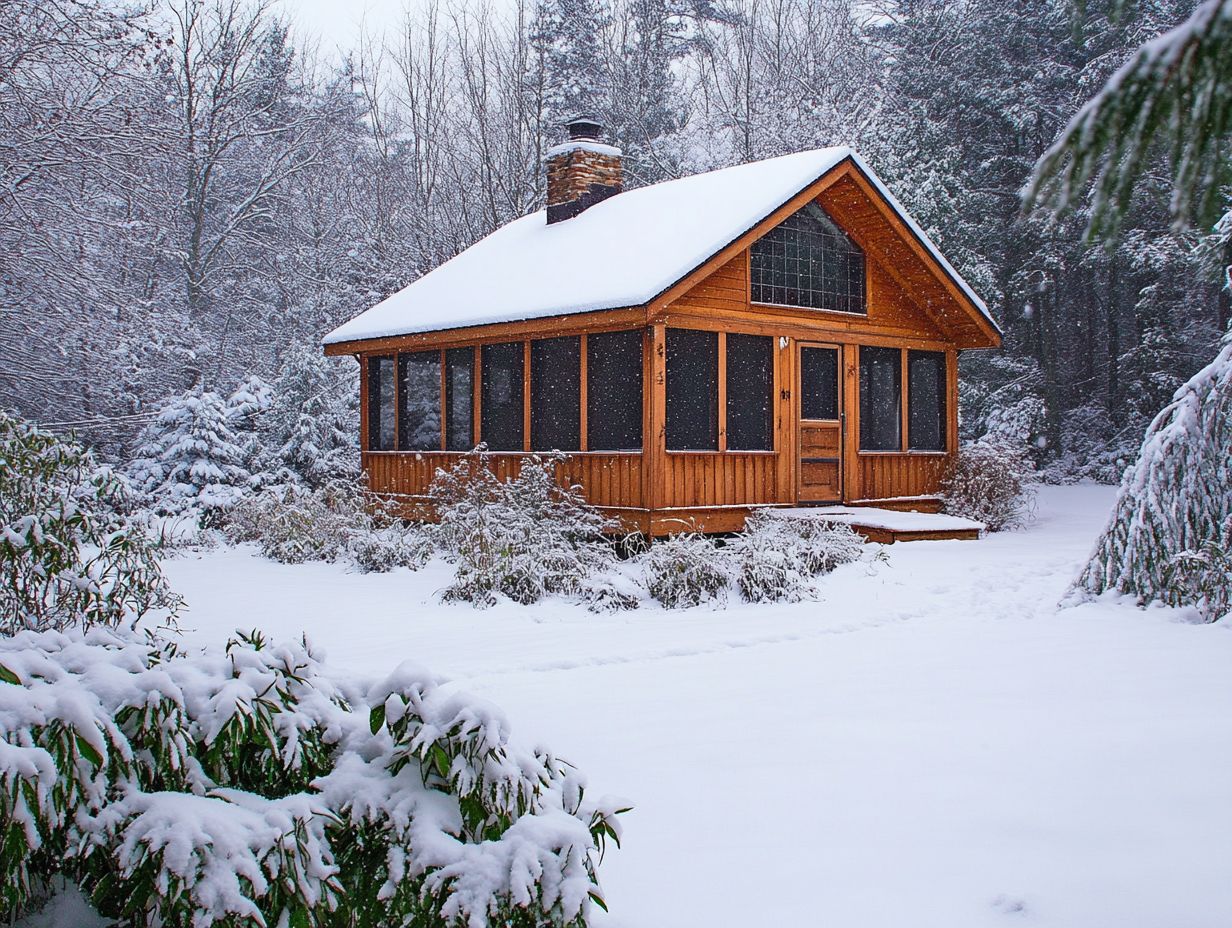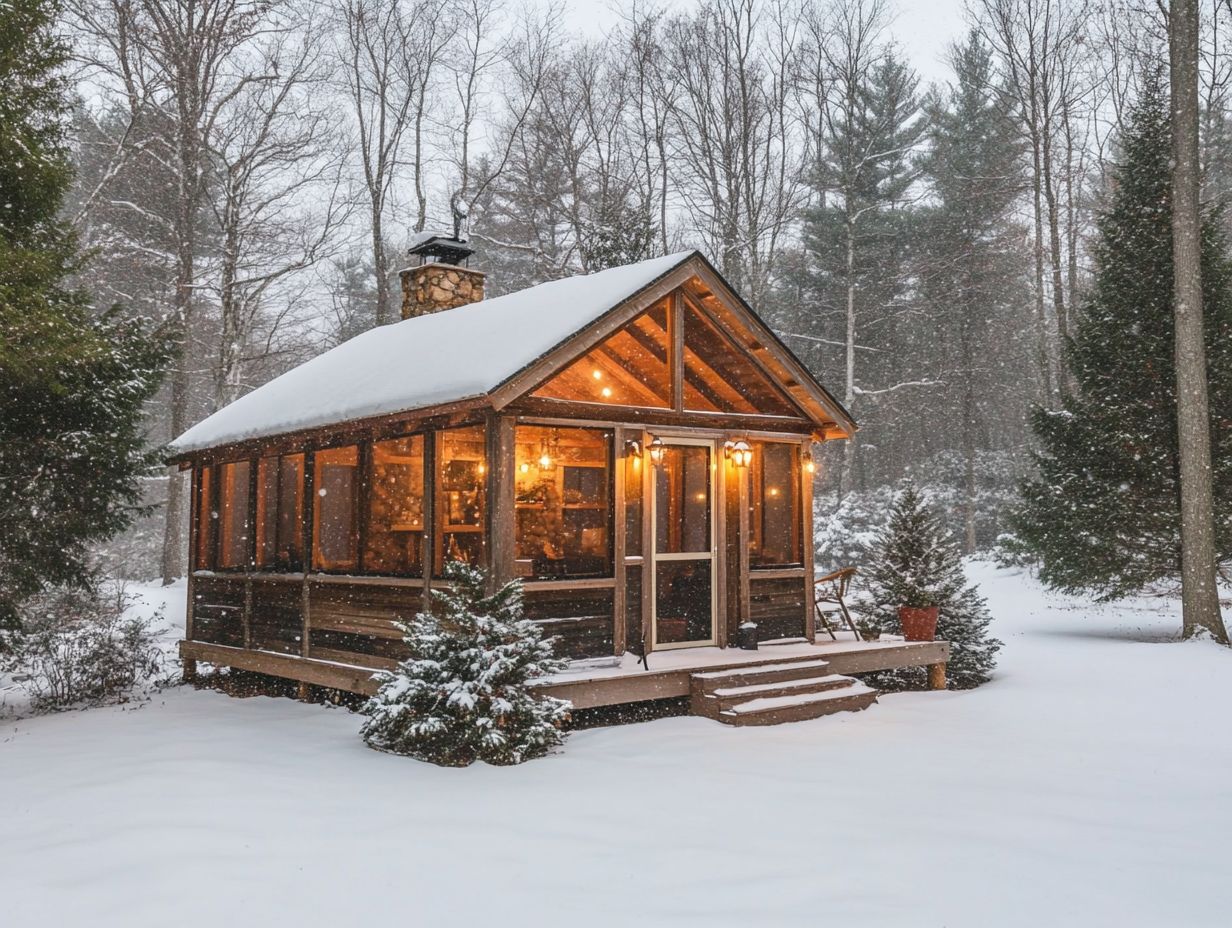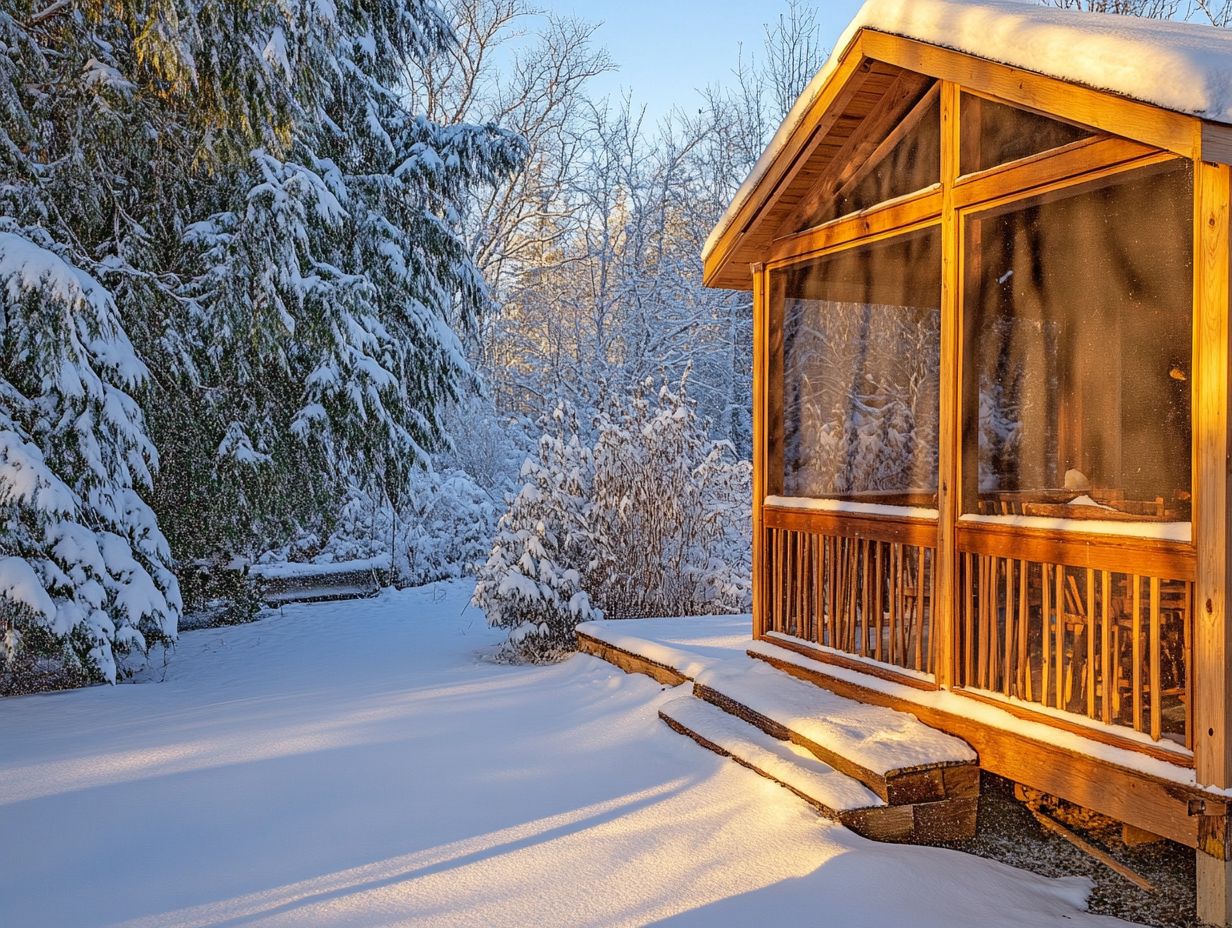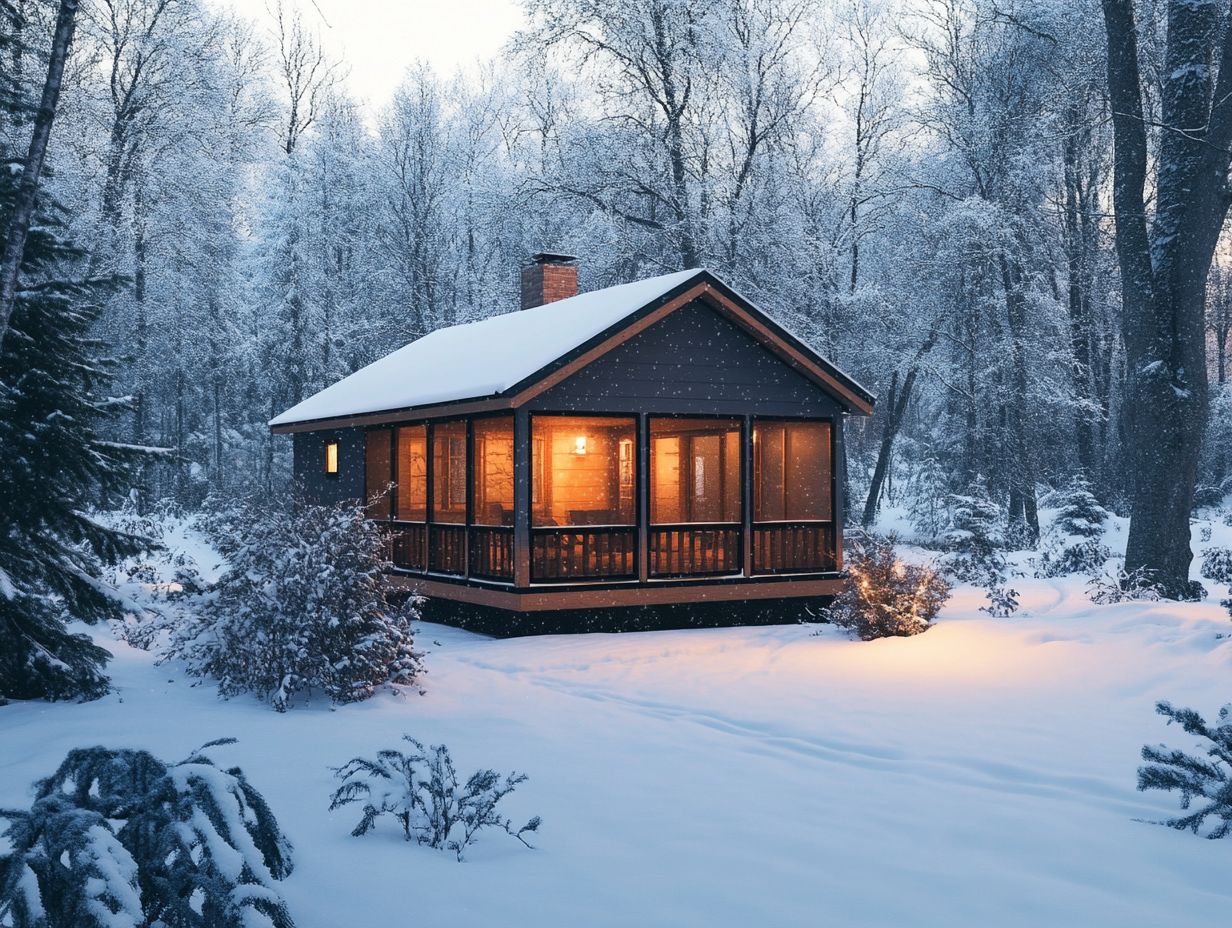5 Tricks to Keep Pests Away in Winter
Winter ushers in cozy nights and festive decorations, but it also brings an unwelcome guest: pests seeking refuge in your home. Don’t let pests ruin your winter comfort!
As temperatures dip, many critters will be on the hunt for warmth, often finding their way into your living spaces. To help you maintain your sanctuary, here are five effective tricks to keep winter pests at bay. These range from sealing gaps to employing natural repellents.
You ll discover why pests tend to be more prevalent during the colder months, identify common intruders, and uncover the advantages of professional pest control.
Keep reading to transform your home into a pest-free haven this winter!
Contents
- Quick Tips to Keep Your Home Pest-Free This Winter!
- 1. Seal Any Cracks or Openings in Your Home
- 2. Keep Your Home Clean and Clutter-Free
- 3. Store Firewood Away from Your Home
- 4. Use Natural Pest Repellents
- 5. Hire a Professional Pest Control Service
- Why Are Pests More Prevalent in Winter?
- How Can You Prevent Pests from Entering Your Home in the First Place?
- What Are the Benefits of Using Natural Pest Repellents?
- How Often Should You Hire a Pest Control Service for Your Home?
- Frequently Asked Questions
- What are the top 5 tricks to keep pests away in winter?
- Why is it important to keep pests away in winter?
- How can I seal cracks and openings to keep pests out in winter?
- What are some natural deterrents I can use to keep pests away in winter?
- Are there any DIY traps or baits I can use to keep pests away in winter?
- How often should I inspect my home for signs of pests in winter?
Quick Tips to Keep Your Home Pest-Free This Winter!

- Seal cracks in your home to block pests!
- Keep your home clean and clutter-free to eliminate hiding spots.
- Store firewood away from your home to avoid attracting pests.
1. Seal Any Cracks or Openings in Your Home
Sealing cracks or openings in your home is essential for effective pest control, especially during the holiday season when unwelcome guests like cockroaches and rodents seek warm shelter. This practice is vital for maintaining a pest-free environment, allowing you and your family to enjoy peace of mind.
By identifying and sealing entry points, you can effectively prevent pests from infiltrating your clean space. Start with a careful check of your property, focusing on areas where moisture sources tend to accumulate, as these conditions attract unwanted visitors.
Using tools like caulk, which fills gaps, and expandable foam will make sealing those pesky openings easier. Install door sweeps and window screens to help keep pests out.
Addressing water leaks and moisture sources within your home is also important, as these environments are prime real estate for pests. Regular inspections and prompt repairs can significantly reduce the likelihood of infestations, ensuring a safe and comfortable space for everyone.
2. Keep Your Home Clean and Clutter-Free
Maintaining a clean and clutter-free home is essential to prevent seasonal pests. A tidy environment reduces pest activity and minimizes hiding spots for unwelcome visitors like cockroaches and rodents, especially in winter when they seek warmth and food. Implementing effective barriers against cold-weather pests can further enhance your home’s defenses.
In commercial settings, the stakes rise. Kitchens and breakrooms become prime targets for pest infestations, making rigorous cleaning schedules necessary. These schedules not only protect food items but also enhance employee safety and productivity.
Regularly clean surfaces, store food in airtight containers, and promptly dispose of leftovers. Training employees to spot signs of pest activity and fostering accountability can elevate hygiene standards dramatically.
By emphasizing the importance of these routines, you not only prevent pest problems but also cultivate a healthier workplace atmosphere.
3. Store Firewood Away from Your Home
Store firewood away from your home. This is essential for pest prevention, as it can attract pests like boxelder bugs and termites.
These pests can easily find their way indoors if the firewood is too close to entry points. Keeping a safe distance and ensuring the wood is dry can help reduce pest activity during winter, following the best practices for pest monitoring in winter.
Control moisture to maintain firewood quality and reduce pest attraction. Excess moisture creates a breeding ground for pests.
Implement smart storage solutions like raised platforms or well-ventilated containers. These enhance drying and moisture reduction.
Best practices include stacking wood off the ground and covering it with a breathable tarp. This keeps pests at bay and your space tidy.
4. Use Natural Pest Repellents

Using natural pest repellents is a smart and eco-friendly approach to pest control. This gives you a humane alternative to traditional pesticides while protecting your space from winter pests. For more specific strategies, check out this guide on how to deal with insects in winter gardens.
You have a variety of options when it comes to natural repellents. Essential oils, like peppermint and lavender, repel unwanted visitors and smell great! Diatomaceous earth is a natural powder that disrupts pests without harmful chemicals.
Understanding this is key! The effectiveness of these methods often relies on having well-trained staff, especially in commercial settings. Equipping your team with knowledge on proper application techniques and the benefits of these natural solutions enables them to tackle infestations effectively while minimizing environmental impact.
5. Hire a Professional Pest Control Service
Hiring a pest control service is a smart move for comprehensive pest management! Specialists can provide targeted solutions, ensuring your home stays pest-free all year.
These experts carry out thorough inspections of your facility to pinpoint vulnerabilities that pests could exploit. This ensures a proactive approach rather than a reactive one.
By maintaining detailed logs of pest activity, they can accurately track infestations and adjust their strategies as needed, significantly enhancing their effectiveness.
Choosing a reputable pest control service that embraces modern techniques fosters a safer environment for you and your occupants. It minimizes reliance on harmful chemicals, benefiting the surrounding ecosystem. This ongoing monitoring not only brings peace of mind but also secures your space against future infestations, making it a smart investment for long-term health and safety.
Why Are Pests More Prevalent in Winter?
As winter sets in, pests like cockroaches and rodents become increasingly common as they search for warmth, food, and shelter. This seasonal behavior underscores the necessity for preventive pest control and a deeper understanding of what drives these invaders to your home or business during the colder months.
With temperatures dropping, these unwelcome guests instinctively seek out cozy hiding spots that offer reliable food sources and moisture. Food processing facilities are particularly vulnerable to these infestations due to their wealth of organic materials and their often changing temperatures.
The combination of food waste and the quest for moist environments makes them a prime target for pests in winter. Adopting tailored strategies for protecting your garden from winter pests is essential for such facilities. This includes routine inspections, maintaining cleanliness, and ensuring that all entry points are sealed, effectively minimizing the vulnerabilities that pests tend to exploit.
What Are the Most Common Winter Pests and How to Identify Them?
Common winter pests like cockroaches, rodents, and boxelder bugs can sneak into your home without you even realizing it. This makes it essential for you whether you’re a homeowner or a facility manager to be vigilant about recognizing the signs of these unwelcome guests and acting swiftly. Accurately identifying pest activity is your first step toward implementing effective pest control strategies to prevent infestations from spiraling out of control.
Pay attention to the specific characteristics that set each pest apart. Cockroaches, for instance, are easily recognizable by their flat, oval bodies and their quick scurrying. Rodents, on the other hand, often leave droppings and gnaw marks as calling cards. Boxelder bugs are a bit more flamboyant with their black bodies adorned by distinctive red markings.
You might notice signs of infestations manifesting as chew marks, droppings, or even peculiar odors emanating from hidden corners. It s prudent to regularly inspect common entry points such as windows, doors, and ventilation systems. Proactive monitoring is crucial for catching any issues early, allowing you to implement timely measures and maintain a pest-free environment.
What Are the Risks of Having Pests in Your Home during Winter?

The presence of pests like cockroaches and rodents in your home during winter poses significant risks, including health hazards, property damage, and food safety concerns. Take action now to protect your family and belongings; understanding these risks can motivate you to adopt effective prevention strategies.
These infestations are more than just pesky annoyances; they can trigger severe allergies and asthma attacks due to the allergens they leave behind. Rodents and insects are notorious carriers of various diseases that can contaminate your food supplies, increasing the risk of foodborne illnesses for your loved ones.
The importance of maintaining a clean living space cannot be overstated. A commitment to rigorous cleanliness, combined with regular pest monitoring, can effectively deter infestations. By implementing these preventive measures, you not only safeguard your health but also preserve the integrity of your living environment, ensuring it remains safe and welcoming for everyone. Don t wait! Start your pest prevention plan today!
How Can You Prevent Pests from Entering Your Home in the First Place?
Preventing pests from infiltrating your home requires a detailed plan. You ll want to implement exclusion tactics, conduct regular inspections, and provide effective training for everyone involved to ensure all potential entry points are secured and monitored.
A clean environment plays a crucial role in significantly reducing the likelihood of pest issues, especially during those colder winter months. To learn more about preventive measures, check out this guide on how to use natural pest control in winter.
As a homeowner, you can take proactive measures to fortify your residence against unwelcome guests. Begin by sealing entry points such as cracks and gaps around doors and windows those pesky openings often act as gateways for various pests.
Regularly cleaning your kitchen and dining areas is another vital step. Ensuring no food residue is left behind acts as a strong deterrent against those little intruders.
Using pest monitoring systems helps you watch for any suspicious activity, providing an early warning before a more significant problem arises.
To boost your pest prevention efforts, create a cleaning schedule. This ensures that every area is regularly cleaned, minimizing potential nesting sites and food sources that could attract pests.
What Are the Benefits of Using Natural Pest Repellents?
The use of natural pest repellents brings a wealth of benefits that you ll appreciate, including their eco-friendly nature, safety for your children and pets, and effectiveness against common pests. This makes them a fantastic choice for anyone keen on maintaining a clean, pest-free environment while minimizing chemical exposure.
You ll find that implementing these methods can beautifully complement traditional pest control strategies.
In various scenarios like your garden or home where young children and pets roam adopting these natural solutions can significantly reduce the risk of toxic exposure. For instance, essential oils such as peppermint or lavender not only keep insects at bay but also infuse your space with a delightful aroma. Likewise, diatomaceous earth a natural powder that helps eliminate crawling pests works wonders when sprinkled in high-traffic areas.
However, it s essential to weave these natural repellents into a comprehensive pest management plan that considers habitat modification and ongoing monitoring. This ensures a holistic approach to pest prevention, keeping your space both safe and inviting.
How Often Should You Hire a Pest Control Service for Your Home?
The frequency with which you should hire a pest control service for your home hinges on several factors, including the level of pest activity, the types of pests you encounter, and the effectiveness of your preventive measures. Many experts suggest regular inspections and treatments, particularly during high-risk seasons like winter.
Engaging professional services can significantly elevate your pest control plan.
To ensure you re fully protected, consider a quarterly inspection schedule that aligns with seasonal shifts affecting pest behavior. For example, spring tends to usher in an uptick in ants and termites, while summer often brings a surge of mosquitoes and wasps. As fall approaches, rodent invasions become more likely as these critters seek shelter, making regular checks an invaluable practice.
Incorporating ongoing monitoring systems allows you to detect pest activities in real-time, enabling prompt action before infestations take root. This proactive approach not only safeguards your home but also provides you with much-needed peace of mind.
Frequently Asked Questions

What are the top 5 tricks to keep pests away in winter?
The top 5 tricks to keep pests away in winter are sealing any cracks or openings, regularly cleaning and decluttering, using natural deterrents, setting traps or baits, and regularly inspecting your home for signs of pests.
Why is it important to keep pests away in winter?
It is important to keep pests away in winter because they can seek shelter and food in your home, potentially causing damage and spreading diseases. To effectively manage this, consider these 5 ways to keep your garden pest-free. Also, pests that survive the winter can lay eggs and quickly multiply once the weather warms up.
How can I seal cracks and openings to keep pests out in winter?
Seal cracks and openings with caulk or weather stripping around your windows and doors.
Check for gaps around utility lines, pipes, and vents. Use steel wool or mesh wire to seal these areas.
What are some natural deterrents I can use to keep pests away in winter?
Natural deterrents like peppermint oil, vinegar, and citrus peels can help keep pests away.
These scents repel pests without harmful chemicals. Consider planting herbs like lavender and basil, as pests dislike them.
Are there any DIY traps or baits I can use to keep pests away in winter?
Yes! You can create DIY traps or baits using household items.
Combining sugar and baking soda, peanut butter and borax, or vinegar and dish soap can effectively catch pests.
How often should I inspect my home for signs of pests in winter?
Make it a priority to inspect your home at least once a month during winter.
Look for droppings, chewed wires or furniture, and holes in walls. Regular checks help prevent pest infestations.






